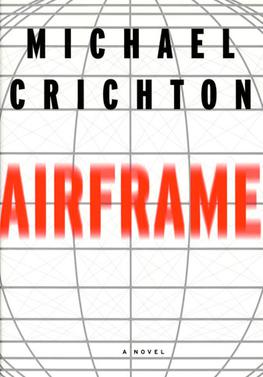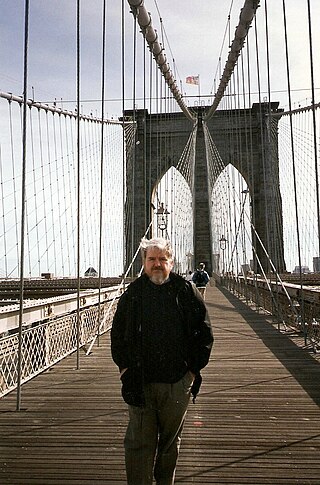Frederick Reiken is an American author from Livingston, New Jersey He has published three novels to critical acclaim, and he teaches creative writing at Emerson College.

Jonathan Allen Lethem is an American novelist, essayist, and short story writer. His first novel, Gun, with Occasional Music, a genre work that mixed elements of science fiction and detective fiction, was published in 1994. In 1999, Lethem published Motherless Brooklyn, a National Book Critics Circle Award-winning novel that achieved mainstream success. In 2003, he published The Fortress of Solitude, which became a New York Times Best Seller. In 2005, he received a MacArthur Fellowship. Since 2011, he has taught creative writing at Pomona College.

Jason Wolkow Epstein was an American editor and publisher. He was the editorial director of Random House from 1976 to 1995. He also co-founded The New York Review of Books in 1963.

Airframe is a novel by the American writer Michael Crichton, his eleventh under his own name and twenty-first overall, first published in 1996, in hardcover, by Knopf and then in 1997, as a paperback, by Ballantine Books. The plot follows Casey Singleton, a quality assurance vice president at the fictional aerospace manufacturer Norton Aircraft, as she investigates an in-flight accident aboard a Norton-manufactured airliner that leaves three passengers dead and 56 injured.

Thomas Louis Berger was an American novelist. Probably best known for his picaresque novel Little Big Man and the subsequent film by Arthur Penn, Berger explored and manipulated many genres of fiction throughout his career, including the crime novel, the hard-boiled detective story, science fiction, the utopian novel, plus re-workings of classical mythology, Arthurian legend, and the survival adventure.
Edward Dahlberg was an American novelist, essayist, and autobiographer.

William Irwin Thompson was an American social philosopher, cultural critic, and poet. He received the Oslo International Poetry Festival Award in 1986. He described his writing and speaking style as "mind-jazz on ancient texts". He was the founder of the Lindisfarne Association, which proposed the study and realization of a new planetary culture.

The Alienist is a crime novel by Caleb Carr first published in 1994 and is the first book in the Kreizler series. It takes place in New York City in 1896, and includes appearances by many famous figures of New York society in that era, including Theodore Roosevelt and J. P. Morgan. The sequel to the novel is The Angel of Darkness. The story follows Roosevelt, then New York City police commissioner, and Dr. Laszlo Kreizler, as their investigative team attempts to solve gruesome murders through new methods including fingerprinting and psychology. The first murder victim investigated is a 13-year-old immigrant who has had his eyes removed, his genitals removed and stuffed in his mouth, and other injuries. The investigators deal with various interest groups that wish to maintain the status quo regarding the poor immigrant population in New York City.

End Zone is Don DeLillo's second novel, published in 1972.
Joseph Prince McElroy is an American novelist, short story writer, and essayist. He is noted for his long postmodern novels such as Women and Men.
Christopher Lehmann-Haupt was an American journalist, editor of the New York Times Book Review, critic, and novelist, based in New York City. He served as senior Daily Book Reviewer from 1969 to 1995.
Geoffrey Donald Page is an Australian poet, translator, teacher and jazz enthusiast.
Ronald Sukenick was an American writer and literary theorist.

Fear and Loathing in Las Vegas: A Savage Journey to the Heart of the American Dream is a 1971 novel in the gonzo journalism style by Hunter S. Thompson. The book is a roman à clef, rooted in autobiographical incidents. The story follows its protagonist, Raoul Duke, and his attorney, Doctor Gonzo, as they descend on Las Vegas to chase the American Dream through a drug-induced haze, all the while ruminating on the failure of the 1960s countercultural movement. The work is Thompson's most famous book, and is noted for its lurid descriptions of illicit drug use and its early retrospective on the culture of the 1960s. Thompson's highly subjective blend of fact and fiction, which it popularized, became known as gonzo journalism. Illustrated by Ralph Steadman, the novel first appeared as a two-part series in Rolling Stone magazine in 1971 before being published in book form in 1972. It was later adapted into a film of the same title in 1998 by director Terry Gilliam, starring Johnny Depp and Benicio del Toro, who portrayed Raoul Duke and Dr. Gonzo, respectively.

Dubin's Lives is the seventh published novel by the American writer Bernard Malamud. The title character is a biographer working on a life of D. H. Lawrence. It first appeared in hardcover from the publisher Farrar, Straus and Giroux in 1979. Portions of the novel originally appeared, in somewhat different form, in The New Yorker, The Atlantic, and Playboy. It is still in print, Farrar, Straus and Giroux having reissued a paperback edition in 2003 with an Introduction by Thomas Mallon.
Lawrence James Davis was an American writer, whose novels focused on Brooklyn, New York.
Russell Henry Greenan was an American author with an established readership in the United States and Europe, particularly France. His first book It Happened in Boston? was reprinted in 2003 in the U.S.A. as a 20th Century Rediscovery by Modern Library. His fourth book The Secret Life of Algernon Pendleton was made into a motion picture titled The Secret Life of Algernon in 1997.

Women and Men is Joseph McElroy's sixth novel. Published in 1987, it is 1192 pages long. Somewhat notably, because of its size, the uncorrected proof was issued in two volumes.

Plus is Joseph McElroy's fifth novel. Set in some unspecified future, it tells the story of Imp Plus, a disembodied brain controlling IMP, the Interplanetary Monitoring Platform, in earth orbit. The novel consists of Imp Plus's thoughts as he tries to comprehend his limited existence, while struggling with language, limited memories, and communicating with Ground Control. The plot is driven by Imp Plus's recall of fragments of his past and of language, his improving comprehension of his present, all while his medical condition gradually deteriorates.
"Mr. Difficult", subtitled "William Gaddis and the problem of hard-to-read books", is a 2002 essay by Jonathan Franzen that appeared in the 9/30/2002 issue of The New Yorker. It was reprinted in the paperback edition of How to Be Alone without the subtitle.











